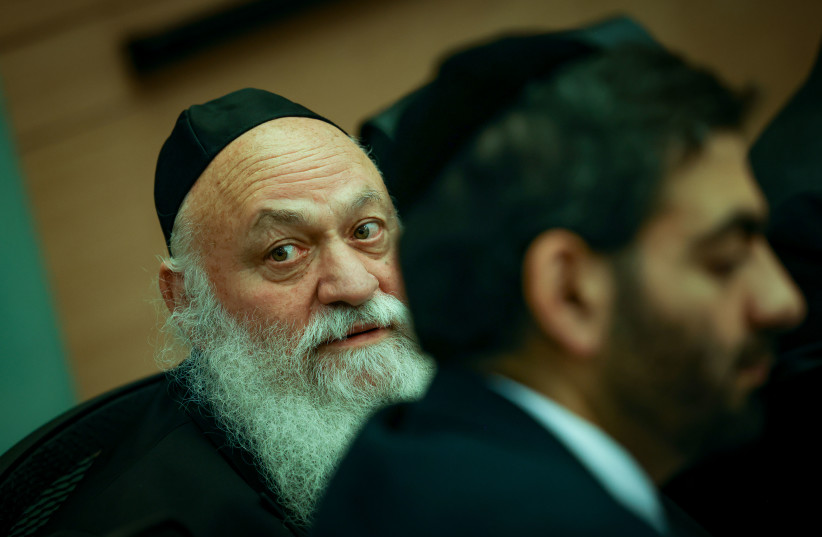The law abrogating the reasonableness standard enacted by the Knesset last week does not, in itself, herald the end of democracy. But the manner in which it was passed shows the willingness of the ultra-Orthodox-settler-Netanyahu government to continue its political coup d’état while trampling the will of the majority of Israelis.
Those who will pay the price, in “cash,” for this conduct are the ultra-Orthodox (haredim) and the settlers in Judea and Samaria – two religious-messianic enterprises that elicit little sympathy from many Israelis, if not criticism or hatred.
Both groups are perceived, rightly, as advancing a coup over the objection of most Israelis, and if they don’t rethink a new course, they will find themselves facing a majority that will stop supporting their continued prosperity, and perhaps their very existence.
The shocks endured in recent months have cut deep fissures into the Israeli body politic. Even if the “dust settles” on this struggle and the government retracts its intention to continue the revolution it started, things will never be the same. This upheaval has opened the eyes of many Israelis who, until now, had the luxury of being immersed in daily life, and who were willing, for the sake of cohesion and unity, to put up with ideological factions using their resources to promote world views far from the national consensus: the haredi way of life and the settlement enterprise.
Haredim, settlers risk losing everything to an enraged Israeli public over judicial reform
The haredim will undoubtedly be the first community to pay a significant price for the current upheaval. The basic data points are well known. The ultra-Orthodox are growing at vertiginous speed; its members evade military service and enjoy budgets that subsidize a way of life featuring Torah study but little work. They bear almost none of the Israeli tax burden, and ideologically reject secular Israel.

Until recently, a large majority of Israelis tolerated the situation. Sometimes they gritted their teeth, sometimes they griped, but they went on shouldering the security and economic burden of the state on behalf of the haredim. The events of the last few months, and the conduct of the government, in full partnership with the haredim, will likely change all that. Utterly blind to reality, the haredim have now gone even further by proposing a new Basic Law: “Torah Study,” which would give draft dodgers a status similar to those serving in the IDF.
The first test will be immediate. As of now, there is no legal basis for exempting the haredim from IDF service. The first thing the Knesset will have to legislate in its next session is a new conscription law. This will have to be done while bonfires are still burning along the Ayalon highway and protesters continue taking to the streets.
FACED WITH yet another step which the majority of Israelis, the burden bearers, perceive as unfair and exploitative, the tumult of recent days may pale in comparison to what is to come. True, the haredim can do whatever they want under the current government, but short of a complete dictatorship here, they will pay the full price when the next government takes power. The budgets that finance their way of life will be slashed, government support for those who don’t prepare their students for a productive life will be terminated, and rights will be denied to those who don’t serve in the army or at least in civilian national service.
The settlers, whose leadership constitutes the far-Right end of the present government that is championing the judicial overhaul, can also expect to pay a high price. The settlement enterprise, despite its growth and expansion, remains controversial. Some Israelis view it as a risk to democracy, others take exception to it for security reasons.
Many who help finance it do so reluctantly. Many who defend it in the course of their regular or reserve IDF service do so grudgingly. In the wake of these past few months, the settlers, and their hardal (“national-haredi”) leaders, are widely regarded as working determinedly against a liberal-democratic Israel. They are perceived as doing so directly, via the judicial-coup laws, and also indirectly, due to the need for control over the Palestinians as part of the settlement-development process.
Such control continually gnaws at Israel’s image as a democracy. And there is another potential risk posed by the judicial coup: IDF soldiers could find themselves in the dock at the ICC in the Hague for their actions in Judea and Samaria.
Until now, most Israelis have put up with this situation as well. Except for fringe groups preoccupied with the “occupation,” Israelis on the political Left and Center have gritted their teeth and continued serving. Refusal to serve in the territories has been marginal. There is a significant chance this is going to change.
The anger aroused by the willingness of the leaders of “religious Zionism” to trample liberal Israel will boomerang on the Zionist enterprise dearest to them – settlement. This will take the form of refusal to serve, in the near term, and in budget cuts and stalled development once the government changes.
Whatever one thinks about the price to be paid by the haredim and the settlers, none of this bodes well for Israeli society. The predatory conduct of the government, which has created deep chasms between us, may end up inflicting damage on Israel’s various communities and their ways of life. It may cause further damage to the IDF, and make Israelis less disposed to the “mutual responsibility” that is so essential to our survival here.
The writer is vice president of the Jewish People Policy Institute and a lecturer in law at the Peres Academic Center.
